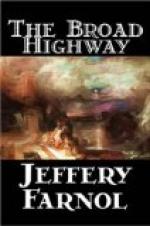“All right behind?” sang out the Driver, over his shoulder.
“All right!” sang back the guard.
“Then—let ’em go!” cried the Driver. Whereupon the ostlers jumped nimbly back, the horses threw up their heads, and danced undecidedly for a moment, the long whip cracked, hoofs clattered, sparks flew, and, rumbling and creaking, off went the London Mail with such a flourish of the horn as woke many a sleepy echo, near and far. As I turned away, I noticed that there remained but three outside passengers; the pale-faced man had evidently alighted, yet, although I glanced round for him, he was nowhere to be seen.
Hereupon, being in no mind to undergo the operation of having my eye filled up, and, moreover, finding myself thirsty, I stepped into the “Tap.” And there, sure enough, was the Outside Passenger staring moodily out of the window, and with an untouched mug of ale at his elbow. Opposite him sat an old man in a smock frock, who leaned upon a holly-stick, talking to a very short, fat man behind the bar, who took my twopence with a smile, smiled as he drew my ale, and, smiling, watched me drink.
“Be you from Lunnon, sir?” inquired the old man, eyeing me beneath his hoary brows as I set down my tankard.
“Yes,” said I.
“Well, think o’ that now—I’ve been a-goin’ to Lunnon this five an’ forty year—started out twice, I did, but I never got no furder nor Sevenoaks!”
“How was that?” I inquired.
“Why, theer’s ‘The White Hart’ at Sevenoaks, an’ they brews fine ale at ‘The White Hart,’ d’ye see, an’ one glass begets another.”
“And they sent ye back in the carrier’s cart!” said the fat man, smiling broader than ever.
“Ever see the Lord Mayor a-ridin’ in ’is goold coach, sir?” pursued the old man.
“Yes,” said I.
“Ever speak to ’im?”
“Why, no.”
“Ah well, I once knowed a man as spoke to the Lord Mayor o’ Lunnon’s coachman—but ’e’s dead, took the smallpox the year arterwards an’ died, ’e did.”
At this juncture the door was thrown noisily open, and two gentlemen entered. The first was a very tall man with black hair that curled beneath his hat-brim, and so luxuriant a growth of whisker that it left little of his florid countenance exposed. The second was more slightly built, with a pale, hairless face, wherein were set two small, very bright eyes, rather close together, separated by a high, thin nose with nostrils that worked and quivered when he spoke, a face whose most potent feature was the mouth, coarse and red, with a somewhat protuberant under lip, yet supported by a square, determined chin below—a sensual mouth with more than a suspicion of cruelty lurking in its full curves, and the big teeth which gleamed white and serrated when he laughed. Indeed, the whole aspect of the man filled me with an instinctive disgust.
They were dressed in that mixture of ultra-fashionable and horsey styles peculiar to the “Corinthian,” or “Buck” of the period, and there was in their air an overbearing yet lazy insolence towards all and sundry that greatly annoyed me.




